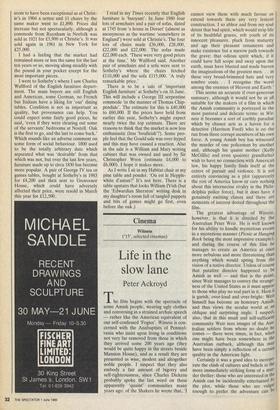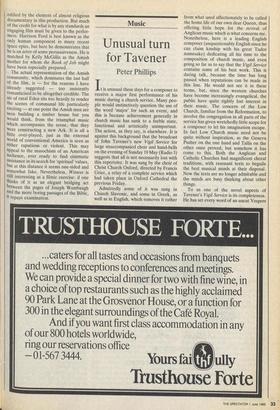Cinema
Witness (`15', selected cinemas)
Life in the slow lane
Peter Ackroyd
The film begins with the spectacle of some Amish people, wearing ugly clothes and conversing in a strained archaic speech — rather like the American equivalent of our self-confessed 'Fogies'. Witness is con- cerned with the Anabaptists of Pennsyl- vania who insist upon living in conditions not very far removed from those in which they arrived some 200 years ago (they would be quite happy in the streets beside Mansion House), and as a result they are presented as wise, modest and altogether noble people. I suspect that they also embody a fair amount of bigotry and self-righteousness, since Charles Dickens probably spoke the last word on these apparently 'quaint' communities many years ago: of the Shakers he wrote that, 'I
cannot view them with much favour or extend towards them any very lenient construction. I so abhor and from my soul detest that bad spirit, which would strip life of its healthful graces, rob youth of its innocent pleasures, pluck from maturity and age their pleasant ornaments and make existence but a narrow path towards the grave: that odious spirit which, if it could have full scope and sway upon the earth, must have blasted and made barren the imaginations of the greatest men. . . in these very broad-brimmed hats and very sombre coats. . . I recognise the worst among the enemies of Heaven and Earth.'
This seems an accurate if over-generous summary, although it would not be at all suitable for the makers of a film in which the Amish community is portrayed in the most pastoral and delicate terms: in Wit- ness it becomes a sort of earthly paradise which by chance acts as a haven for a detective (Harrison Ford) who is on the run from three corrupt members of his own force. A young Amish boy has witnessed the murder of one policeman by another and, although his quaint mother (Kelly McGillis) and even quainter grandfather wish to have no connection with American law, his happy family finds itself at the centre of pursuit and violence. It is not entirely convincing as a plot (apparently the rest of America know or care nothing about this internecine rivalry in the Phila- delphia police force), but it does have a genuinely exciting climax and there are moments of interest dotted throughout the film.
The greatest advantage of Witness, however, is that it is directed by the Australian Peter Weir. He is well known for his ability to handle mysterious events in a mysterious manner (Picnic at Hanging Rock being the most impressive example), and during the course of this film he manages to create an America at once more nebulous and more threatening than anything which would spring from the vision of a native director. Unless of course that putative director happened to be Amish as well — and that is the point, since Weir manages to convey the strange' ness of the United States as it must appear to those who play no real part in it. Here it is garish, over-loud and over-bright: Weir himself has become an honorary Amish, and thus views the secular world at an oblique and surprising angle. I suspect, also, that in this small and self-sufficient community Weir sees images of the Aus• tralian settlers from whom no doubt be comes — there were times, in fact, when one might have been somewhere in the Australian outback, although this maY have been simply a reflection of a certain quality in the American light.
Certainly it was a good idea to incorpo' rate the clash of cultures and beliefs in the more immediately striking form of a ma" der thriller: those who are interested in the Amish can be incidentally entertained by the plot, while those who are vulgar enough to prefer the adventure can he edified by the element of almost religious documentary in this production. But much of the credit for what is by any standards an engaging film must be given to the perfor- mers: Harrison Ford is best known as the only human component in many recent space epics, but here he demonstrates that he is an actor of some persuasiveness. He is matched by Kelly McGillis as the Amish mother for whom the Book of Job might have been especially prepared.
The actual representation of the Amish community, which dominates the last half of the film, is — for the reasons I have already suggested — too insistently romanticised to be altogether credible. The air of rural Eden sits too heavily to render the scenes of communal life particularly exciting — at one point the Amish men are seen building a timber house but you would think, from the triumphal music which accompanies the scene, that they were constructing a new Ark. It is all a little over-played, just as the external world of conventional America is seen as either rapacious or violent. This may appeal to the masochism of an American audience, ever ready to find cinematic assistance in its search for 'spiritual' values, but at this distance it seems one-sided and somewhat fake. Nevertheless, Witness is still interesting as a filmic exercise: if one thinks of it as an elegant bridging act between the pages of Joseph Wambaugh and the more boring passages of the Bible, It repays examination.



















































 Previous page
Previous page